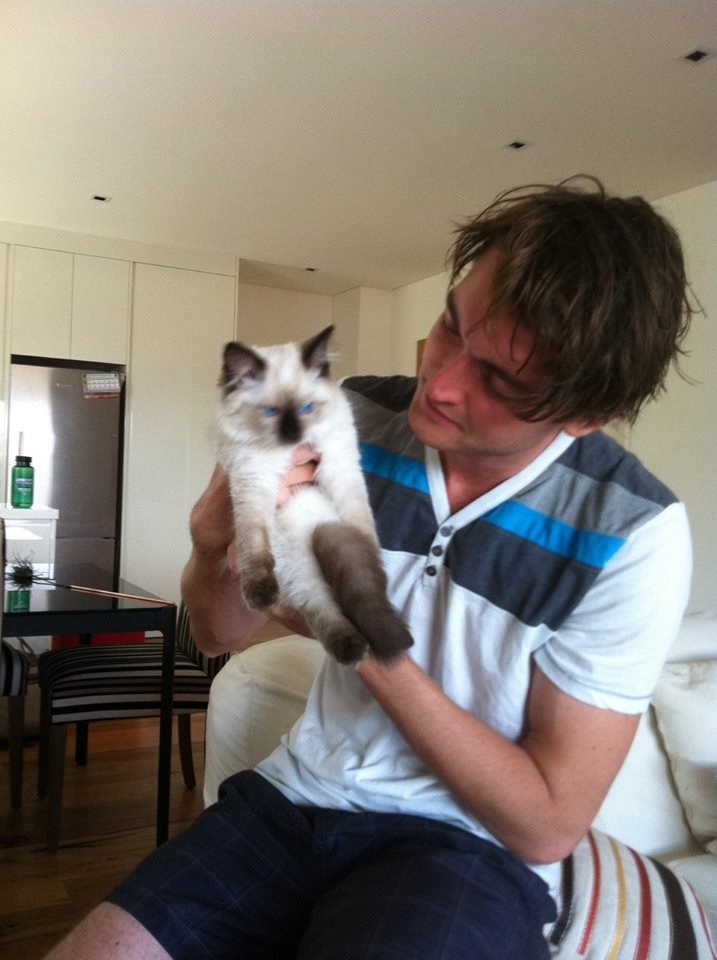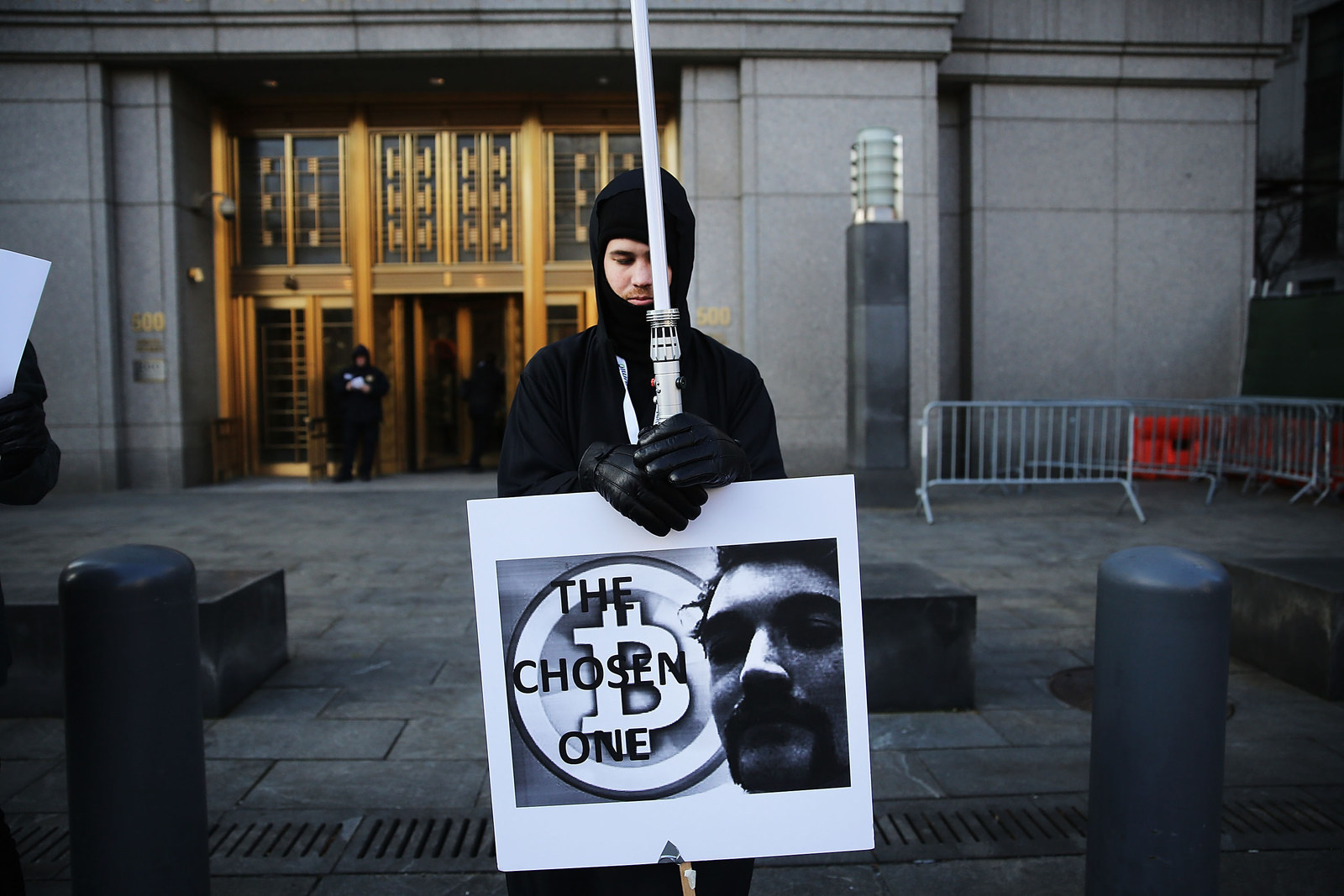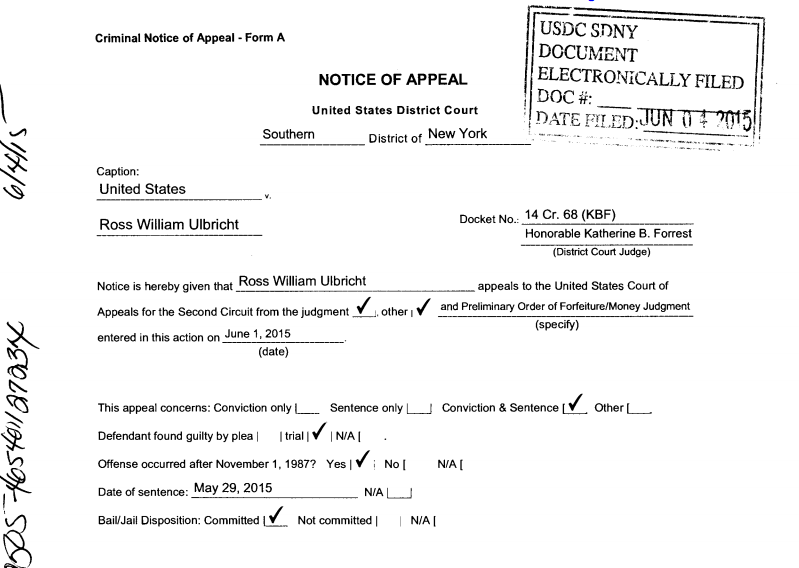
Ross Ulbricht, 31, the mastermind behind the darknet marketplace Silk Road, has filed an appeal to overturn his drug trafficking and conspiracy conviction and life sentence.
On May 29, Ulbricht was sentenced in federal court to life in prison without the possibility of parole.
Before delivering her sentencing decision, Judge Katherine Forrest addressed Ulbricht for close to an hour, telling him he was a “complicated person” who didn’t fit the “typical criminal profile.”
However, Forrest told Ulbricht it was clear he wanted Silk Road to be his legacy, "and it is.”
Forrest said she spent more than 100 hours contemplating her decision, telling Ulbricht, “You are no better a person than any other drug dealer.”
The judge called his online messages arrogant, quoting his response to a friend’s request that he devote his time to a more upstanding, legal pursuit: “Because I’m running a goddamn multimillion dollar criminal enterprise.”
“What you did in connection with Silk Road was terribly destructive to our social fabric,” Forrest said.
Ulbricht stood and appeared stoic as he received two life sentences for the harshest charges — narcotics trafficking over the internet and continued criminal conspiracy.
Ulbricht’s mother, who was sitting in the second row of the courtroom, pressed her fingers into her forehead.
When his sentencing was adjourned, Ulbricht looked back as his family as he was led away by two officers. His mother sat for a moment and cried.

What Is the Silk Road?
In 2011, Ulbricht created the website as an online marketplace where people could buy whatever they wanted anonymously. He managed the website under a number of anonymous handles, the most well known being “Dread Pirate Roberts” after the popular character from the movie The Princess Bride.
The site operated on the anonymous internet, or “darknet,” accessible only by using the encryption software TOR — an acronym for “The Onion Router,” a program name reflecting the layers of security. All transactions on the Silk Road were completed using Bitcoin, the well-known crypto-currency.
In a journal entry introduced in court, Ulbricht wrote, “In 2011, I am creating a year of prosperity and power beyond what I have ever experienced before. Silk Road is going to become a phenomenon and at least one person is going to tell me about it, unknowing that I was its creator.”
How Silk Road Blew Up
The online bazaar became an Amazon-like retailer for dealing drugs and other illicit goods. Several thousand vendors sold LSD, heroin, cocaine, marijuana, and other drugs anonymously.
In a June 2011 profile of the site, Gawker’s Adrian Chen wrote: “Making small talk with your pot dealer sucks. Buying cocaine can get you shot. What if you could buy and sell drugs online like books or light bulbs? Now you can: Welcome to the Silk Road.”
Federal investigators said there were more than 1.5 million transactions on the site. Evidence presented by the government at trial showed that Silk Road generated more than $213 million in revenue between January 2011 and October 2013.
Vocativ reported marijuana sales accounted for more than $46 million on Silk Road, while heroin sales were worth about $8.9 million.
Ulbricht took a commission on every deal, amassing a fortune of more than $18 million in Bitcoins before the feds started to close in.

The Bust of Dread Pirate Roberts
In October 2013, Ulbricht was arrested by FBI agents in a San Francisco library, his laptop seized while still logged in to the Silk Road as Dread Pirate Roberts.
He was charged with seven federal counts, including narcotics trafficking, computer hacking, and money laundering.
He was also accused of soliciting the killings of six people he believed were threats to the site’s business.
At trial, the prosecution said there is no evidence that the killings actually took place or that anyone was harmed. Still, the judge said there was "ample and unambiguous evidence" that Ulbricht intended to have people killed.
During sentencing, Forrest read several posts that detailed how Ulbricht commissioned a hit on a blackmailer with someone he thought was a Hells Angel, but who turned out to be an undercover government agent.
"There's no evidence that he was role-playing," Forrest said.

The Trial of Ross Ulbricht
At trial, Ulbricht pleaded not guilty to all the charges.
His lawyer argued that Ulbricht created the Silk Road as an “economic experiment,” but then turned the site over to others when it became too popular for him to manage.
“He created it as a completely freewheeling, free-market site that could sell anything, except a couple items were harmful,” Ulbricht's attorney Josh Dratel told the jury.
Dratel said that after giving up the site, Ulbricht was eventually lured back as a “fall guy” when the investigation heated up.
The prosecution said the Silk Road was Ulbricht’s “baby” and promised to show the jury “a mountain of evidence” that proved he was the owner and operator of the site.
“His idea was to make illegal drug deals as quick and easy as ordinary online shopping,” prosecutors told the jury.
After Ulbricht was busted, the office of Preet Bharara, U.S. attorney for the Southern District of New York, said private messages from Dread Pirate Roberts matched evidence recovered from Ulbricht’s laptop, connecting the two.
In court, the prosecution cited journal entries that Ulbricht kept while building and running the site, and a college friend, Richard Bates, testified that Ulbricht told him about the project after seeking his help with programming.
“He shared with me that he created and ran the Silk Road website,” Bates said.
The prosecution illustrated the alleged murder-for-hire plots during the trial. They argued Ulbricht solicited the killings “to retaliate against a former staff member who he believed had stolen Bitcoins from the site and who he feared would provide information about the site to law enforcement, and to eliminate the threats posed by others who were threatening to publicly leak the names and addresses of Silk Road users and vendors.”
In one example, prosecutors said that in 2013, Ulbricht paid Silk Road user Redandwhite to kill user FriendlyChemist, who had threatened to publicize real names and addresses of site vendors and customers unless Ulbricht gave him $500,000.
In his closing argument, prosecutor Serrin Turner told the jury that Ulbricht used his “dark corner of the internet” and “made it easier for drug dealers to get users hooked, users from all over the world.”
In February 2015, Ulbricht was found guilty on all seven counts after the jury deliberated for three and a half hours. The charges against him demanded a sentence of at least 20 years, but he was ultimately sentenced to life in prison without the possibility of parole.
Ulbricht didn’t testify at his trial, but prior to sentencing, he broke his silence in a letter to the judge.
“I’ve had my youth, and I know you must take away my middle years, but please leave me my old age,” Ulbricht wrote in his plea for leniency. “Please leave a small light at the end of the tunnel, an excuse to stay healthy, and excuse to dream of better days ahead, and a chance to redeem myself in the free world before I meet my maker.”
A Teary Ross Ulbricht Says He’s Changed
Ulbricht spoke out for the first time since his arrest in court during his sentencing hearing.
He immediately became choked up and fought back tears as he told the court he’s spent the past 20 months locked up “grappling with the possibility that I’ll never be free again.”
“I’ve changed. I’m not the same man from when I created Silk Road or from when I was arrested,” Ulbricht said, adding that he was “wiser” and “humbled” by his experience in jail.
“I’ve essentially ruined my life and broken the hearts of my family and closest friends,” Ulbricht said.
He added that if he should ever get out of prison, “I would never risk causing that heartbreak again and never break the law again.”
Ulbricht objected to the government’s characterization of him as a greedy sociopath who only created the site to enrich his personal fortune and further a political agenda.
“I’m not a self-centered, sociopathic person trying to express some inner badness," he said. "I’ve made some serious mistakes."
Ulbricht talked about how he would relish the chance to experience the little things in life that many take for granted, such as “throwing a Frisbee to a dog in a park,” or Thanksgiving dinner with family.
He closed his court address by telling the judge, “I’m ready for whatever sentence you think is wise.”
Ulbricht Found Liable for Drug Overdose Deaths
Forrest denied Ulbricht’s request to not consider the deaths of several people who overdosed after procuring drugs from the Silk Road.
At sentencing, Forrest said that while Ulbricht was “not convicted of killing these people,” there was “strong circumstantial evidence” that connected their deaths to Silk Road.
The judge recounted details from five overdose deaths in court.
When “Jordan M” was found dead of a heroin overdose, his computer browser was opened to the Silk Road.
There was “Preston B,” the 16-year-old who died when he jumped from a hotel balcony after taking a synthetic drug called “N-Bomb” that his friend purchased on the Silk Road.
His mother, Vicky, said in court that a friend had offered her son “a tablet to stay awake” and “happy” at a post-prom party.
“One stupid tablet cost my son his life," she said.
Forrest also brought up 25-year-old “Brian B,” who was found dead next to a syringe with heroin in it that he had bought from the Silk Road three days earlier.
His father, Richard, told the court that his son had been managing the "urges” associated with his addiction “until he discovered Ross Ulbricht’s Silk Road.”
Richard, who asked the court to impose the “most severe sentence” possible, glared at Ulbricht as he left the stand.
Forrest also noted the overdose deaths of “Alejandro N” and “Jacob M," both of whom had also used Silk Road to order illicit drugs.
In his statement, Ulbricht said that he found the victims’ stories “incredibly moving” and he was “so sorry to the families.”
But Forrest did not buy it.
“I don’t think that you feel a lot of remorse,” Forrest said. “I don’t think that you know that you hurt a lot of people.”

What Happens Next
Bharara said the verdict “should send a clear message to anyone attempting to operate an online criminal enterprise.”
“The supposed anonymity of the dark web is not a protective shield from arrest and prosecution," he added.
Outside the courthouse after the sentencing, Dratel called the life sentence "unreasonable, unjust, unfair."
Lyn Ulbricht said she's very concerned for her son's safety if he gets sent to a maximum security prison.
"I fear for his life," she said.
In a bizarre twist in the story, two government agents involved in the investigation of Silk Road were also indicted on federal charges in connection to the bust of Ulbricht.
Carl Mark Force and Shaun Bridges, Drug Enforcement Administration agents who were assigned to the Secret Service, are accused of money laundering and wire fraud in connection with actions during the investigation.
Both men were part of a Baltimore-based task force that investigated Ulbricht separately from the Manhattan group. Following their indictments, Bharara said that their operation was separate from his office. Defense attorneys were unable to introduce details of the Force investigation at Ulbricht’s trial.
During the Baltimore group’s investigation, Force allegedly made contact with Dread Pirate Roberts under several fictitious user names not sanctioned by the government, communicated with him using encrypted messaging, and attempted to extort $250,000 from Ulbricht in exchange for withholding secret information from the government.
According to the complaint, during the investigation, Force deposited $776,000 in misappropriated Bitcoins into his personal accounts and Bridges diverted $800,000 to his.
Dratel referenced the corruption charges against the feds in his remarks after Ulbricht's sentencing, saying that it is clear that the case agent who made the first contact with Dread Pirate Roberts was "entirely corrupt."
Ross Ulbricht's appeal will be heard in the second circuit of the U.S. Court of Appeals in New York City.

